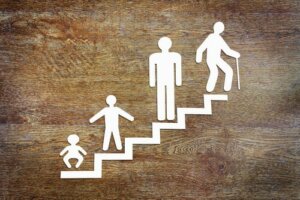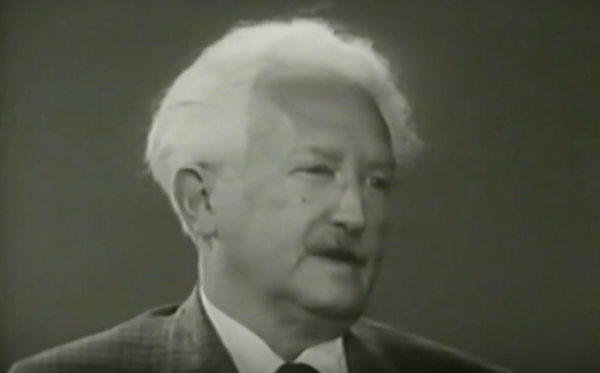The 8 Life Stages According to Erikson

Within the psychoanalytic field, we can find authors who follow the assumptions of Freud’s psychoanalysis in an orthodox way and others who modify these postulates in some way. Erik H. Erikson was one of the latter, as he expanded and modified Freudian theory. He emphasized the influence of society on the developing personality and didn’t consider the family environment as responsible in a unitary way. Also, he put forward eight life stages, which we’ll talk about in this article.
In his genetic model, Freud considered a succession of stages through which each person would pass from birth to adulthood. He called this succession of stages “phases of psychosexual development“. For psychoanalysis, sexuality is a dimension of utmost importance, as it constitutes one of the main sources of vital energy that influences human behavior.
Freud called this vital energy libido, which had to be repressed and removed from consciousness in order not to provoke any conflict.
For orthodox psychoanalysis, this sexual energy doesn’t appear for the first time in adolescence. They say that it’s present from birth, and, more importantly, according to Freud, each stage is related to our emotional and sexual side. Because of this, Freud developed five stages: oral, anal, phallic, latency, and genital.
Erikson, for his part, doesn’t attach the same importance to psychosexual development as his predecessor did. He focused more on the role of social influence in explaining the evolution of the human psyche. Because of this, he developed phases of psychosocial development.
At each vital stage, a crisis manifests that the person must overcome in order to move on to the next stage.

The eight life stages
Erikson was a pioneer in considering that the development of the self is a lifelong process. He understood development as a succession of eight stages that manifest themselves throughout the human life cycle. At each stage, the individual has to:
- Meet their needs.
- Develop their capabilities.
- Respond to the demands of their age-appropriate environment.
If the person doesn’t resolve the crises, then they won’t develop successfully. So, according to Erikson, it’s necessary to successfully complete one stage in order to correctly move on to the next one. These are Erikson’s eight stages:
- Basic trust versus mistrust. This occurs from birth to about one year of age. At this stage of life, a baby has to trust others to meet their most basic needs. Children can learn to see the world as a dangerous place if their caregivers reject them in any way, or if their parents are overly protective, showing the child that the world can be a dangerous place and not allowing them to safely explore it. Here, the key social figures are the primary caregivers or other attachment figures.
- Autonomy versus shame and doubt. This occurs between the ages of one and three. Children need to start to learn to be autonomous in terms of dressing, sleeping, or eating. If they fail to do so, they may doubt their abilities and feel embarrassed about themselves. Here, the social agents are the parents.
Initiative versus guilt
- Initiative versus guilt. At this stage, the child’s mission is to feel that they have initiative and that, if they do this well, then it shouldn’t clash with other people’s rights, privileges, or goals, and won’t produce any guilt in them. The partner agent here is the family. This stage takes place between the ages of three and six.
- Diligence versus inferiority. From the age of six to about 12, children enter a period in which people compare them to other children. As a result, they have to master social and academic skills in order to feel confident enough to deal with these situations. Failure in this regard will lead to feelings of inferiority. The social agent here is the teacher.
- Identity versus role confusion. This stage takes place from the age of 12 until 20. As they reach adolescence, the child tries to find their own identity. They have to establish social identities and basic occupations, in order for them to not be confused about the roles they’ll play as adults. The key social agents are their peers.
Intimacy versus isolation
- Intimacy versus isolation. In early adulthood and into their forties, the main thing they need to do is make strong friendships and to achieve a sense of love and companionship. If they don’t achieve this, then they experience feelings of isolation or loneliness. The social agents are partners, spouses, and friends.
- Productivity versus stagnation. From 40 to 65 years old. The task in this stage is to increase productivity at work, teach and bring up the family, and address the needs of the young people in the family. If they don’t take on these responsibilities, they’ll stagnate and fall into self-centeredness. The social agents here are spouses/partners, children, and cultural norms.
- The integrity of self against desperation. In old age, from the age of 65 onwards, adults tend to look back on their lives and may either find a meaningful, productive, and happy experience, or a major disappointment with promises and goals that they didn’t fulfill. One’s own experiences and, above all, social experiences, decide the way in which this final crisis is resolved. The key social agent is the human race.

The strength of the ego
As we’ve just seen, Erikson proposes that we need to resolve every crisis that arises in the different life stages of our development. By resolving each conflict, the person will grow emotionally and psychologically. However, not only is it important to resolve the conflicts that arise, but it’s also essential to acquire the skills that will help us deal with these conflicts.
If we acquire these skills, thanks to our social agents, and are able to solve all the crises that arise, then we should be free of any psychopathologies. However, it’s important to remember that, if we don’t succeed, then we may get stuck in some of them and won’t be able to develop correctly.
When we acquire the necessary skills, we’ll experience a rewarding sense of mastery, called ego strength.
All cited sources were thoroughly reviewed by our team to ensure their quality, reliability, currency, and validity. The bibliography of this article was considered reliable and of academic or scientific accuracy.
Papalia, D.E., Olds, S.W. y Feldman, R.D. (2005): Psicología del desarrollo en la infancia a la adolescencia. McGraw-Hill. Madrid.
This text is provided for informational purposes only and does not replace consultation with a professional. If in doubt, consult your specialist.








